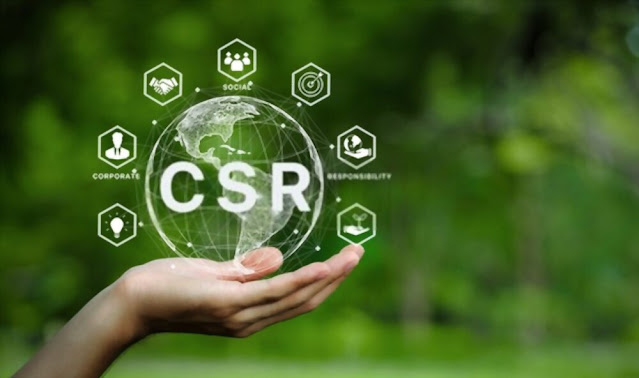
In this modern era, businesses are
responsible for their practices and how they impact the environment and
society. CRS, or corporate social
responsibility, has transformed into a consumer-driven demand from being
a respected business practice. The
corporate
social responsibility model will outline
how a business can easily be responsible to its stakeholders, staff members,
the public, and local and global settings. When you implement a CSR model, it
will do a lot more than help society and the environment. It will also
positively impact your business’s reputation.
People these days are becoming much more
socially conscious, for they wish to prioritize all those businesses that keep
their concentration on social responsibility. CSR practices can surely help
boost employee morale because the employers and the employees will gain a sense
of purpose in their work. Once you learn all the effective ways to implement
the CSR model, you will get to know its importance.
Types of Corporate Social Responsibility Examples
To have a good understanding of CSR and
also the CSR business model, the following CSR examples will surely inspire
you.
1. TenTree [Community
and Tree Planting Projects]
Founded in 2012, TenTree is a Canadian
clothing company with corporate social responsibility embedded within its
business model. The company does it by planting ten trees whenever they sell.
When customers purchase from them, they receive a code.
They can use the code on the company’s
official website to track down the places where all the trees are getting
planted, ranging from Madagascar to Canada to Nepal. Wherever they plant trees,
the company takes up community projects for all good causes, such as sustainable
development, drinking water, job creation, education, and many more.
2. Patagonia [Environmental
and Sustainability Impact]
This American outdoor clothing company
was launched back in 1973. Patagonia is widely known as the trailblazers of
CSR, and they view themselves as an "ACTIVIST FIRM." The primary
focus of this company is climate change problems. They lessen their
environmental impact by:
· Reducing and repairing their carbon footprint
·
Working
with renewable energy
· Encourage the clothing longevity
Patagonia also imposes an “EARTH TAX” on
themselves as they donate 1% of all their sales to environmental non-profits.
3. BNP Paribas [Employee
Giving and Volunteering]
This is one of the leading European
banks, which is located in Switzerland, and it has been active since 1872. BNP
Paribas has countless CSR initiatives that have been going on for the past
several years, but they started to develop a lot with Alaya.
Besides that, employee solidarity and
engagement are central pillars of BNP Paribas' CSR tactic. To develop this
particular pillar, they provide all employees with 16 hours or two working days
for volunteer initiatives.
Currently, the company has reached 40%
of employee participation and has solidified its position as a socially
responsible player within the financial sector. They integrate employee
aspiration and purpose within their business’s fabric.
4. Walt Disney Company
The Walt Disney Company ranks high on
the list of most successful CSR initiatives. The company believes that the
thing that has the "DISNEY" name on it is something they are
responsible for. The company always acts responsibly, which has been its main
priority. On the other hand, Disney constantly looks for innovative but
alternative ways to lessen its environmental impact.
In 2009, the company determined to reach
all the environmental targets. Being a part of the CSR tactic, the Walt Disney
Company offered all the philanthropic giants over $75 million to protect the
plant and save wildlife. Disney’s long-term objective is to reach a “ZERO”
state of net waste and the greenhouse gas commissions. They also cut down their
emissions in half back in 2020.
They also reduced their net emissions by
44% in 2018 and diverted 54% of their incineration and waste. In 2020, they
were to divert the waste and incineration by 60%, which was their ultimate
goal. They also published their targets, which kept their customers, their
shareholders, and also themselves account. Here are the corporate social responsibility
projects of Disney:
·
Lessen all the environmental impact by running all
the resort trains on biodiesel, which is created from the recycled cooking oil
from hotels and eateries.
· Awards grants to all the
non-profit companies for their environmental conservation effort from the
Disney Conservation Fund.
· Increasing the population
of at-risk wildlife with the help of conservation projects. These projects help
animals, which include tigers, sharks, sea turtles, rhinos, monkeys,
butterflies, and apes.
5. Woolworths
This is a massive supermarket chain from
Australia, which was founded back in 1924. The company recently made an
announcement that they will separate from their investment within the pokies
business. This is something that has been costing all the Aussies billions of
dollars each year. The pokies machines are designed to induce addictive
tendencies, and over 300,000 Australians are addicted to these machines.
The company's investment in pokies
machines and wagering has been pretty beneficial for the wallet but risky
regarding reputation. Social media callouts and protests on this problem have
significantly increased, for which Woolworths decided to move out. After
listening to all the public demands, the supermarket chain decided to make an
optimistic impact on society.
The decision will be expensive to the
company’s net income, but it will show their commitment to all their social
values. This is a trait that is admired and expected across the globe these
days.
One Last Thought
CSR, or corporate social responsibility
strategy, has become extremely crucial in today’s digital era. Many businesses
want a CSR strategy that can help them have a positive impact on the
environment. If you wish to participate in projects that will benefit society
and its surroundings, you need help from companies like Light Money. The company utilizes sourced
data from all the well-known and values-aligned Academic programs and NGOs.
They also use data that can be accessed by the public easily.





